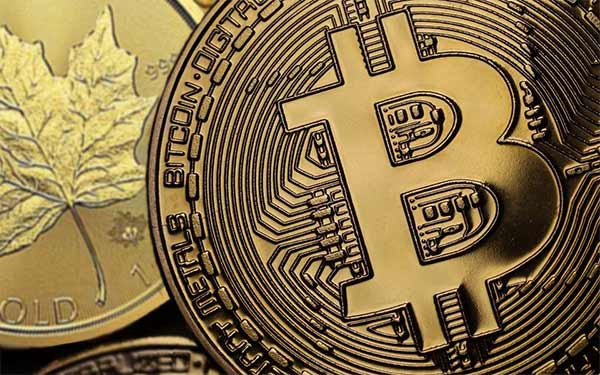Quod gratis asseritur, gratis negatur, or so goes the immortal latin saying that something which can be asserted gratuitously can dismissed gratuitously. Many alternative and contrarian investors have been asking the question of the year: is bitcoin better than gold? Is Bitcoin the best thing since sliced bread or a fad with little foundation in lasting value?
In this article we look at the risks inherent to Bitcoin (and the crypto-currency market), and how these stack up to gold. If you are not an extremely conservative investor, should you sell out of precious metals and buy into the crypto-currency craze? Are you wisely boarding the early train or foolishly getting on too late?
Sounds straight-forward, right? Probably not. Whenever you are approaching alternative investments, especially ones as speculatively volatile as Bitcoin, be very careful. Impartial rationality is especially important to this endeavour. Despite plenty of people buying up Bitcoin, there is little consensus on its potential long-term impact. Ethereum founder Vitalik Buterin pointed out the difference between throwing around money and making a positive social impact.
You might go further in determining I bitcoin better than gold by asking about its staying power as an investment vehicle. It is backed by neither back-up capital nor earning power. All we know is that there are a lot of questions, and no one seems to have the answers.
Is Bitcoin better than Gold? A Comparison.
We do our best to make a few points that should help you compare gold and Bitcoin. Along the way, we try to tease out some fundamental differences between the two forms of investment. Some are obvious, while others more nuanced.
The basics: is Bitcoin better than gold?
Is Bitcoin a Currency? Is Gold?
Yes. Bitcoin was created fundamentally as a form of currency. People who own bitcoin can use it purchase things at establishments that accept bitcoin. Gold is a yes and no. Ever since the floating fiat system was put in place gold has remained more-or-less outside the currency market.
You rarely walk into a grocery store and use a piece of gold to buy things. That being said, in theory most shop keepers would gladly take gold is they knew it was real much sooner than Bitcoin. Moreover, why do big banks trade gold at currency desks rather than commodity desks?
Is Bitcoin better than gold as investment vehicle?
There are three main issues with bitcoin as an investment vehicle akin to gold.
1. Overvalued.
Is Bitcoin tremendously over-valued? Will the bubble will soon burst? Chief among many factors to consider is popular adoption. How many people are using Bitcoin to buy things? How long do people stay in Bitcoin? Ultimately, will Bitcoin come to be valued much like other currencies? Technically, there is a finite amount of Bitcoin in the world.
If you "mine" most of the Bitcoin, even institutions might see fit to assign it a sticky value. On the other hand, sharks in global financial waters may continue investing in various new 'coins'. So how do we justify a value for Bitcoin? We do not have any cash-flows to discount, and supply and demand are all over the place with new coins.
2. It’s Being Copied.
Continuing from the above, answering is Bitcoin better than gold requires a Bitcoin have some uniqueness as an investment vehicle. Can Bitcoin be unique if it is being copied? Many other forms of cryptocurrency are emerging. Since bitcoins initial success, Bitcoin has shown a stong tendency to splinter.
Ethereum, Litecoin, Zcash - the many others - have broken down demand into smaller constituencies. In fact, many of these new cryptocurrencies represent advancements to the initial bitcoin product. For example, Filecoin is based on hosting-sharing, and promises to incentive more efficient global processing power and storage use. Are these more likely to succeed in the long-run, as popular currencies or transaction ledgers?
3. Diminishing returns.
A key component to Bitcoin's early success was the ease of producing "mining" it. Does it still make sense? If you want to ask when is Bitcoin better than gold, then here you have an answer: early on. Unfortunlty, in the worlds of Warren Buffet "what the wise man does in the beginning the fool does in the end."
The promise of diminishing returns motivated many early Bitcoin miners, and today what was a large pool of miners has become a small pool of large miners. Since the early 2010s, mining on anything but AMD-graphics-card enabled gaming computers became unprofitable.
In fact, 2013 saw the introduction of Application-Specific Integrated Circuits, which mined so much more effectively that it became too difficult without them. With so greatly diminished margins, the average investor is restricted to buying and selling on high-transaction-cost exchanges.
On all these fronts, bitcoin shows major risks compared to rewards for the average investor. For comparisons sake, let’s ask the same question of gold:
1. Is Gold Overvalued?
To begin with, trying to set a stable value to Gold prices can be a nightmare. The range of disagreement is so high that former Chairman of the Federal Reserve, Ben Bernanke, has said outright he doesn't understand it. Still, gold is an ancient precious metal. It has historically enjoyed strong demand.
Gold mines and monetary policies have usually been able to keep demand in check. As your timeframe gets longer, however, gold appears to become a more stable investment. Will it really bubble and burst orders of magnitude lower than where it is?
2. Is Gold Being Copied?
Can gold be replicated? Are there easy alternatives? Other precious metals such as silver and platinum may or may not be partially in industrial demand, but gold stands alone. For millennia, people have tried making gold out of anything else. While it may not always be the most expensive precious metal, i.e. platinum regularly overcomes the price of gold, it appears to be the historic investing choice. Is gold the is most valuable precious metal?
A long-term problem for those precious metals lacking basis as fundamental currency is as declining demand. Platinum, palladium, and rhodium are used in huge proportions by the automotive industry for emissions control. Lacking this support could significantly change the market for the worse.
3. Can Gold Devalue Itself? '
Gold is in a variety of industries, but its primary uses are jewelry and investment. People like keeping gold close at hand for more enduring reasons. Unlike bitcoin, which loses overall value when it splinters, demand for gold is much harder splinter.
Silver, and perhaps Platinum are the only alternatives for most investors. Still, not being able to create new 'golds' does guarantee golds value. That is left to the investor.
Could a Bitcoin bubble be good news for gold investors?
Overall gold investment will not falter due to Bitcoin, however, many people have shifted their focus away from metals. Could this raise the question of an undervalued gold market? We think so. Moreover, in the event of a Bitcoin crash, it is likely most investors will flee to gold.
In comparing these two investment vehicles, it has probably become clear that Bitcoin has some risks you were not aware of. Over time, excessive risk proportionate to return will create signifiant losses. Still, there is no harm in exploring a new investment that shows great potential. Based on our comparison, however, a long-term investor might feel that buying gold will remain the more solid investment.
So is Bitcoin better than gold? Well, Bitcoin does not appear to be convincing everyone. It may, in fact, benefit from Bitcoin's eventual drop.
If you believe that the two serve different purposes, it makes no sense to ask is Bitcoin a better investment than gold. In any case, it’s far too early to say exactly what purpose Bitcoin will serve in the end. On one hand, Bitcoin may come to have a more meaningful impact in coming years.
Moreover, a new ICO will present a truly socially useful currency alternative. On the other hand, Bitcoin might crash. In any case, when you assert value without evidence, you should probably dismiss it as such.

